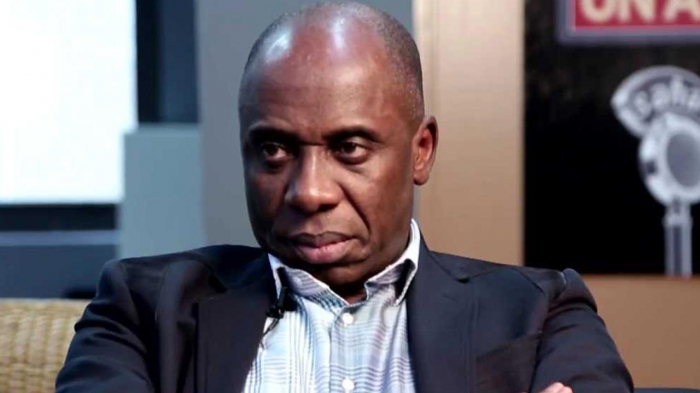THE EXECUTIVE 16/03/2022
Why 12 Per Cent Of NIMASA Revenue Can’t Go To Maritime University, By Amaechi

Transportation Minister Rotimi Amaechi has explained why 12 per cent of revenue being generated by the Nigeria Maritime Administration and Safety Agency (NIMASA) revenue cannot go to the Nigerian Maritime University, Okerenkoko, Delta State.
Kicking against a proposal to commit 12 per cent of the agency to the specialised varcity, the minister told his audience that the institution gets subvention from the Federal Government through the Education Ministry.
Amaechi spoke at a public hearing on three Bills relating to the maritime industry organised by the House of Representatives Committee on Maritime Safety, Education and Administration.
Represented by the Director, Legal Services, Pius Oteh, Amaechi described the proposal as excessive as it does not adequately take cognisance of the diverse responsibilities of NIMASA in a challenging fiscal environment.
He said the proposal, in one of the Bills to amend the NIMASA Act 2007 to strengthen the institution, appears to not recognise the fact that as a public institution regulated by the Nigerian Universities Commission (NUC) and Federal Ministry of Education, the institution would equally be entitled to funds publicly appropriated by the National Assembly on a yearly basis.
He, however said the Ministry, because of its recognition of the crucial role that the institution plays in developing local capacity within the maritime sector, would continue to support the university.
House of Representatives Speaker Femi Gbajabiamila, said the aim of the Bills is to ensure the maritime sector of the national economy operates optimally.
He said it is to make the sector more attractive to investors and better suited to meet the needs of the people who rely on the maritime industry in various ways, including as a source of jobs and economic opportunity.
The Speaker said efforts at reforming the sector will continue because of the efforts being made to diversify the economy from over-reliance on income from the sale of fossil fuels, the shipping and maritime transportation industry represents a significant untapped resource.
He said the parliament has an obligation to advance policies and legislation to unlock the potential in that sector and maximize the potential economic benefits to the Nigerian people.
However, in carrying out this role, Gbajabiamila cautioned against over-regulation of the industry.
Chairman of the House Committee, Lynda Ikpeazu, said the maritime sector is a foundation and catalyst to growth of nations that possess marine endowments.
She said Nigeria, by any standard, is well endowed by ocean coastline, rivers and a rich marine biodiversity.
Ikpeazu said the fact that Nigeria’s marine pedigree has not translated into a vibrant maritime industry has remained a paradox to all.
She said that as lawmakers charged with legislating, oversighting as well as representing the sector they are poised to reverse this trend.
The lawmakers said: “Not only are we focused on making the maritime sector a key alternative source of revenue and economic growth to our dwindling oil resources, we are also poised to develop a prosperous blue economy for our nation, akin to similar successes in other maritime nations around the world.
“It is in this light that this public hearing is very important. It is an avenue to tap into the views and obtain inputs of both operators and regulators, who in any case will be at the receiving end of their implementation, and other sector experts.”



